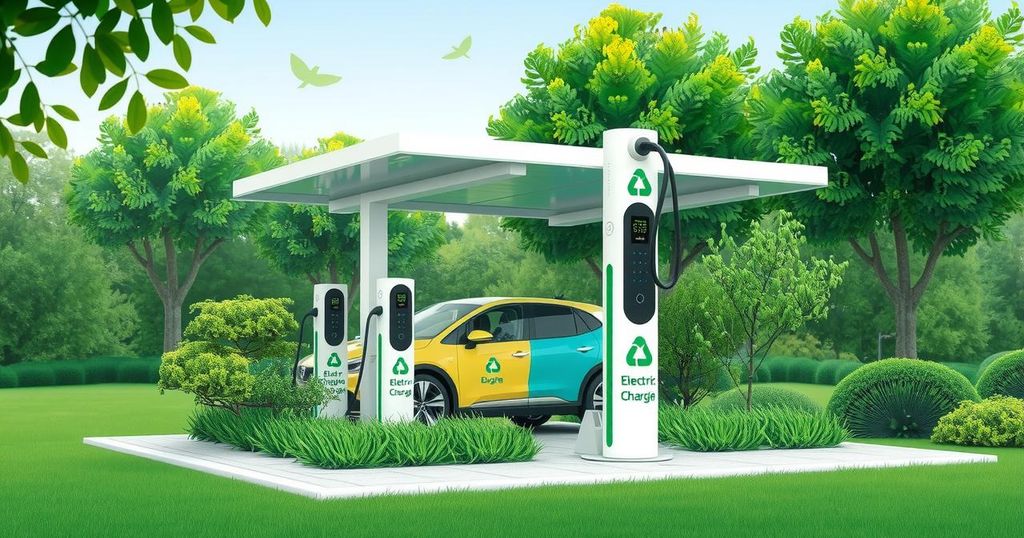Rwanda’s Rwf1.2 Billion Carbon Market Project to Boost Electric Vehicle Adoption

Rwanda is launching a Rwf1.2 billion carbon market project to increase electric vehicle adoption and capacity among stakeholders. Funded by the GGGI and collaborating with REMA, the project supports developing carbon reduction initiatives across various sectors. While requiring up to $900 million for full electric vehicle implementation by 2030, it aims to entice private sector investment and promote sustainable growth through strategic partnerships and financial incentives.
The Rwandan government’s initiative to establish a Rwf1.2 billion carbon market aims to enhance awareness and build capacity among stakeholders. This initiative, named the Rwanda Article 6 Readiness and Carbon Market Framework Operationalisation, is funded by the Global Green Growth Institute (GGGI) and will be executed in partnership with the Rwanda Environment Management Authority (REMA) over two years. The project aims to support the development of high-quality carbon reduction projects across various sectors, including agriculture, energy, and transport.
REMA has identified renewable energy projects, particularly electric vehicles (EVs), as key components of the carbon market. These initiatives present opportunities for investors in project design and identification. A carbon market functions by enabling the sale and purchase of carbon credits, which represent one tonne of carbon emissions reduction, allowing companies to offset their emissions and meet climate goals.
The transition to electric vehicles and their necessary infrastructure in Rwanda is projected to require an investment up to $900 million by 2030. Investors will benefit from financial incentives based on the amount of emissions mitigated and sold in the carbon market. This carbon market framework represents a pivotal measure to encourage private sector involvement in advancing a carbon-neutral economy.
Srinivas Cheruvu, Managing Director of CFAO Mobility Rwanda, noted the sustainability EVs offer, stating that fossil fuel-powered vehicles significantly contribute to pollution. He explained how electric vehicles like the BYD Dolphin, which can travel 340 kilometers at a charging cost significantly lower than combustion engine alternatives, can attract investments in the carbon market, particularly for corporate fleets.
Cheruvu also pointed out the importance of tax exemptions for furthering EV adoption in Rwanda, promoting the government’s commitment to clean energy. Despite the encouraging progress, he acknowledged that charging infrastructure remains a challenge, with users struggling with long charging times due to inadequate public charging stations.
Teddy Mugabo, CEO of the Rwanda Green Fund, indicated that efforts are underway to enhance EV infrastructure through funding e-mobility companies. Faustin Munyazikwiye, Deputy Director General of REMA, highlighted the importance of renewable energy projects within the carbon market strategy, mentioning partnerships with Singapore and Sweden to foster capacity-building and mobilize climate finance.
In December 2023, at COP28 in Dubai, Rwanda introduced its National Carbon Market Framework, aimed at facilitating carbon credit trading to help achieve climate targets by 2030. Despite delays in the implementation of this framework, efforts are concentrated on overcoming obstacles related to awareness and capacity. Munyazikwiye emphasized that developing this market is crucial for attracting international investments and advancing sustainable development.
Caroline Raes, GGGI Country Representative in Rwanda, underlined the need for equitable participation in carbon markets to secure investments in emissions reduction initiatives. She affirmed that enhancing Rwanda’s readiness for international carbon markets will provide substantial financial resources, promote climate action, and catalyze the transfer of green technology.
The establishment of Rwanda’s Rwf1.2 billion carbon market represents a significant stride toward promoting electric vehicle adoption and enhancing renewable energy initiatives. With substantial funding required and various partnerships developed, Rwanda is positioning itself to leverage international climate finance, despite facing challenges in infrastructure. The initiative aims to create a sustainable, carbon-neutral economy, while attracting investments in emissions reduction and green technology.
Original Source: www.newtimes.co.rw




